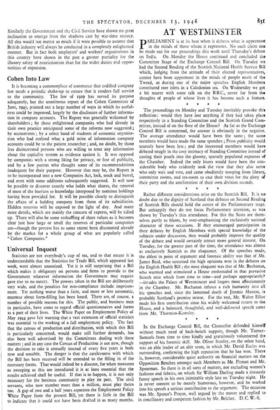AT WESTMINSTER
PARLIAMENT is at its best when it debates what is uppermost in the minds of those whom it represents. No such claim can be made out for our proceedings this week until Thursday's debate on India. On Monday the House continued and concluded the Committee Stage of the Exchange Control Bill. On Tuesday we had the Second Reading of the Scottish National Health Service Bill which, judging from the attitude of their elected representatives, cannot have been uppermost in the minds of people south of the Tweed, as during one of the major speeches English Members constituted rare islets in a Caledonian sea. On Wednesday we got a bit nearer with some talk on the B.B.C., never far from the thoughts of people of whose lives it has become such a feature.
* * The proceedings on Monday and Tuesday inevitably provoke this reflection: would they have lost anything if they had taken place respectively in a Standing Committee and the Scottish Grand Com- mittee, instead of on the floor of the House? As far as the Exchange Control Bill is concerned, the answer is obviously in the negative. The average attendance would have been the same ; the same members would have made the same speeches ; Press publicity would scarcely have been less ; and the interested members would have debated snugly in the cosy intimacy of Standing Committee instead of casting their pearls into the gloomy, sparsely populated expanses of the Chamber. Indeed the only losers would have been the con- siderable body who evidently took the view that they also serve who only wait and vote, and came obediently trooping from library, committee rooms, and tea-room to cast their votes for the glory of their party and the amelioration of their own division records.
* * Rather different considerations arise on the Scottish Bill. It is no doubt due to the dignity of Scotland that debates on Second Reading of Scottish Bills should hold the centre of the Parliamentary stage. But unhappily they do not focus Parliamentary attention, as was shown by Tuesday's thin attendance. For this the Scots are them- selves partly to blame, by over-emphasising the exclusively national character of these occasions. If they encouraged participation in their debates by English Members with special knowledge of the subjects under discussion, they would probably improve the quality of the debate and would certainly attract more general interest. On Tuesday, for the greater part of the time, the attendance was almost as exclusively Scottish as the eloquence. Of the speeches made, the ablest in point of argument and forensic ability was that of Mr. James Reid, who sustained the high opinions won in the debates on the English Health Bill ; the most eloquent was that of Mr. Buchanan, who warmed and stimulated a House enshrouded in that pervasive Scotch mist which from time to time—and perhaps appropriately? —invades the Palace of Westminster and lingers most affectionately in the Chamber. Mr. Buchanan infuses a rich humanity into all his speeches and, since the lamented death of Jimmie Maxton, is probably Scotland's premier orator. For the rest, Mr. Walter Elliot made his first contribution since his widely welcomed return to the House, and a balanced, thoughtful, and well-delivered speech came from Mr. Thornton-Kemsley.
* *
In the Exchange Control Bill, the Chancellor defended himself without much need of back-bench support, though Mr. Turner- Samuels from time to time kindly and gratuitously volunteered the support of his forensic skill. Mr. Oliver Stanley, on the other hand, was an able leader of an able team, in which Mr. David Eccles was outstanding, confirming the high reputation that he has won. There is, however, considerable quiet authority on financial matters on the Opposition Benches amongst such Members as Mr. Pitman and Mr. Spearman. So there is in all sorts of matters, not excluding women's fashions and fabrics, on which Sir William Darling made a riotously funny speech in his own inimitable style late on Tuesday night. He is never content to be merely humorous, however, and he worked into his speech a serious contribution to the argument. The occasion was Mr. Spence's Prayer, well argued by the mover and replied to in conciliatory and competent fashion by Mr. Belcher. D. C. W.-S.


































 Previous page
Previous page